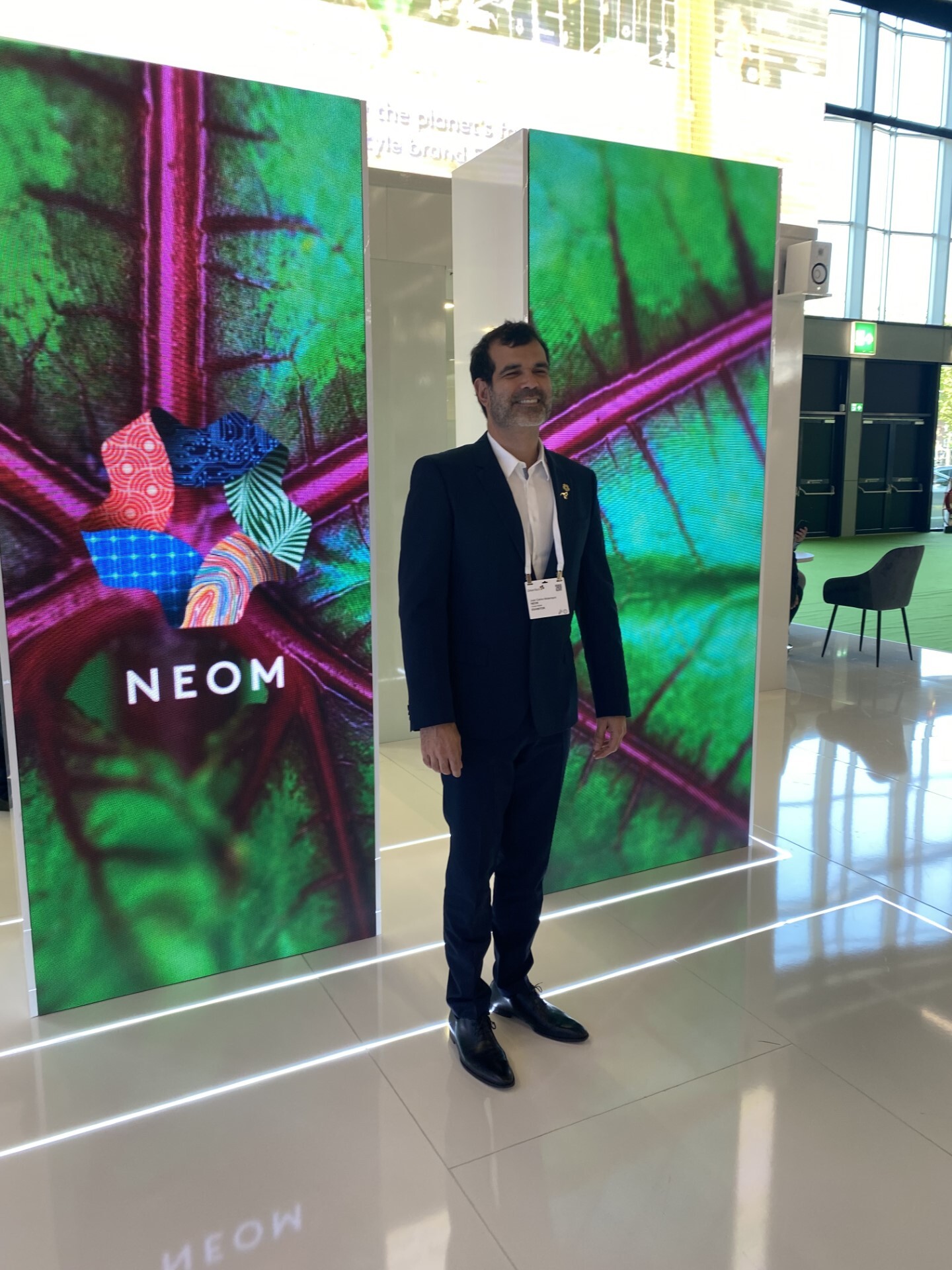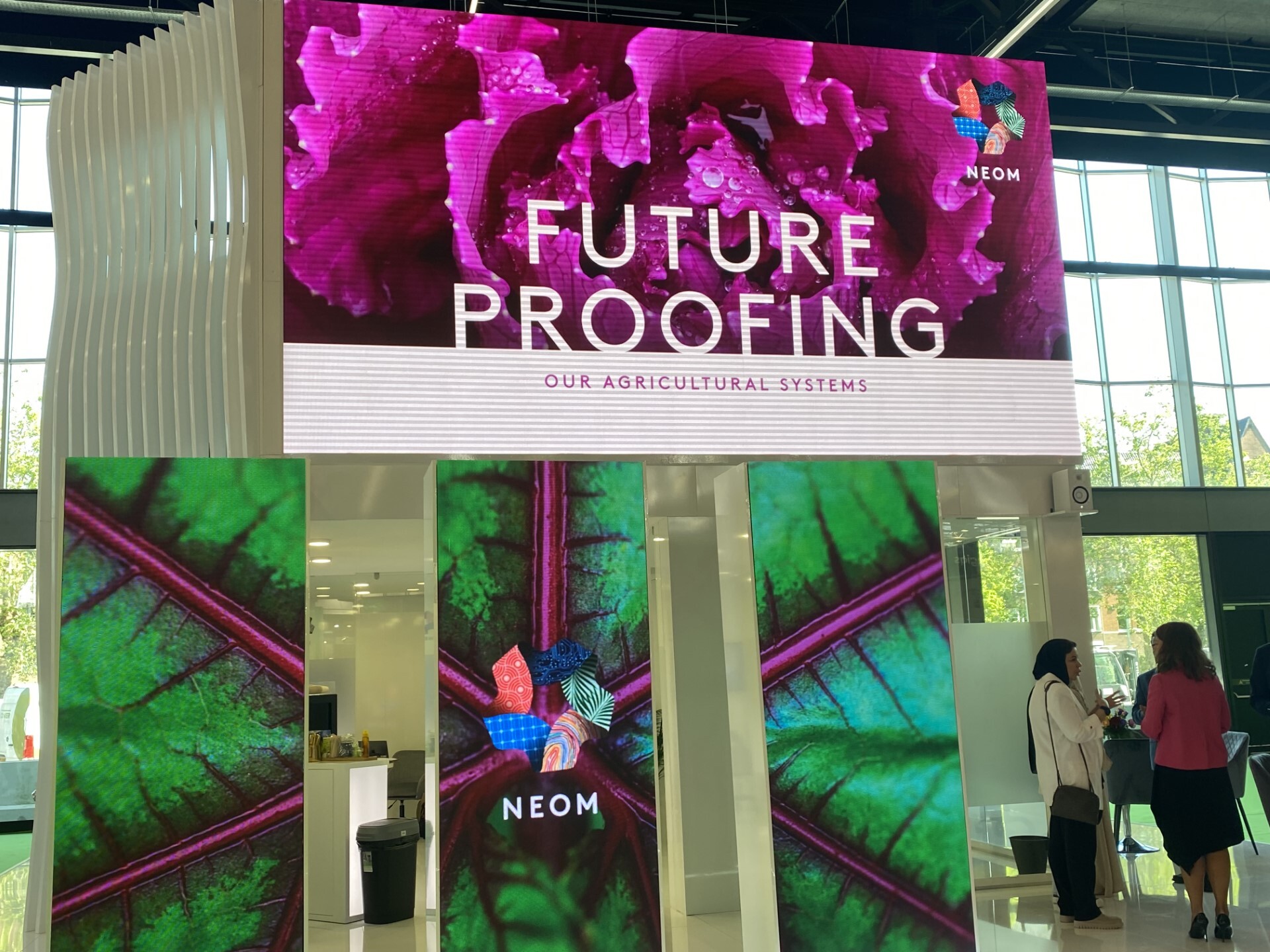Neom Food aims for a decentralised, fully sustainable supply chain
“The future will be shaped, in large part, by how we produce, process, and consume food,” said Dr Juan Carlos Motamayor, general director of Neom Food, adding: “The future of food is the future of mankind.” Neom Food has adopted a pioneering approach to designing a fully sustainable and decentralised food system in a dry region, without using underground water resources. The first mid-term objective is to supply the local population of Neom city with vegetables, fruit and proteins so as to reach about 1 million people by 2030. The second objective is to develop Neom as a logistics hub for Saudi Arabia and the Middle East region. “With climate change we cannot fully rely anymore on food imports. So self-sufficiency food is a priority in our country,” said Motamayor.
Neom Food’s strategy is based on 5 pillars: climate-proof agriculture, regenerative aquaculture, novel foods (e.g. plant proteins and synthetic dairy), personalised nutrition, sustainable food supply and ESG (Environmental and Social Governance). Aquaculture, berries, table grapes, leafy greens and tomato will be the first sustainable food productions tested on a large scale, in partnership with leading technology companies, prior to massive production in the future. “We have a modular approach using technology like vertical farming, since our goal is to produce food at a competitive cost with international markets,” said Motamayor.
The current challenges that climate change is posing
Motamayor stated during a speech at the Greentech exhibition in Amsterdam last June that “the global food system is an important contributor to climate change, like the fossil fuels industry”. Indeed farming practices are depleting our soil and freshwater resources. Excess use of fertilisers is creating dead zones in the oceans, rivers, and lakes. “90% of our fisheries are at risk or in decline,” said Motamayor, who believes that production is focused on a few breadbaskets that are failing due to climate change.
“Most modern agricultural practices were developed at a time when climate change was not the reality it is now,” said Motamayor. “The agricultural model is now making climate change worse and climate change in turn makes our current food production model unsustainable. It’s a vicious circle that urgently needs to be broken. We must produce more with less. Less land. Less water. Particularly in arid conditions like in the Middle East.” According to Motamayor, we can no longer afford to put all our eggs in one basket (or a few breadbaskets), which means we mustn’t rely on a few world regions to export most of the calories consumed worldwide. More importantly, it is vital to learn how to produce food in the face of the challenges that climate change is posing.
What is Neom Food doing?
Neom is in a region of northwestern Saudi Arabia that faces an extreme climate for food production. It is the same climate that, due to climate change, more and more countries will face in the near future. “At Neom Food, we’re a fast-growing, international community of innovators, entrepreneurs and scientists who are developing, testing, and commercializing new ideas and new technologies to develop future-forward industries that tackle the key challenges humanity is facing today,” said Motamayor. “We’re fortunate that our region is a living laboratory and testbed, where we have the freedom to try out new approaches to living and working, including all aspects of the food chain – from production to consumption.”
The food sector is one of the key fourteen sectors being developed in Neom. This requires learning how to grow crops efficiently in desert conditions, using production systems best suited to extreme heat and water scarcity. “We are currently piloting large-scale technological projects to test various combinations of technology that will lead to food self-sufficiency and mitigate climate change by reducing food miles,” said Motamayor.
Reducing food miles
Indeed, decentralising food production could help reduce food miles. “Projections on climate change indicate that even if we completely halt fossil fuel use now, without addressing emissions from the food industry, we would still fail to reach the 1.5°C maximum warming target by the end of the century,” warned Motamayor. Moreover, food transportation contributes significantly to the emissions generated by the food industry. Another crucial aspect is the efficient use of water. Due to resource overuse and climate change, the gap between global water supply and demand is projected to reach 40% by 2030. “Our commitment to nature conservation at Neom makes us exclude the use of natural aquifers,” stated Motamayor. Instead, Neom Food plans to develop agriculture based on desalinated water, which, of course, involves additional production costs.
A call for collaboration
“The challenges we face are daunting, but they are not insurmountable,” said Motamayor. With creativity, collaboration, and commitment, the solutions needed can be developed to grow crops under extreme heat and water scarcity, to adapt to and mitigate the impacts of climate change, and to create a more sustainable and equitable world. “The future of our planet, and of all life on it, depends on our actions today. Let’s rise to this challenge. Together, let’s grow tomorrow’s agricultural system,” concluded Motamayor.





